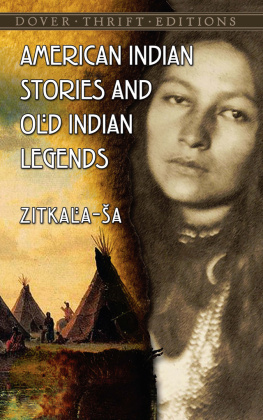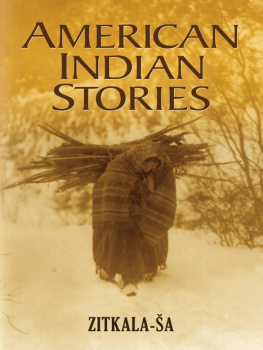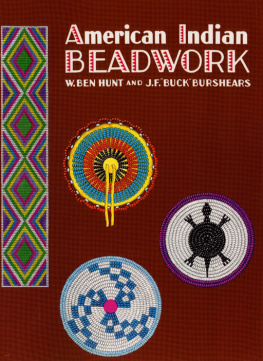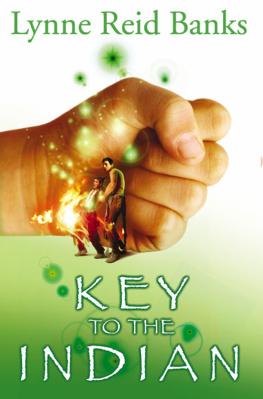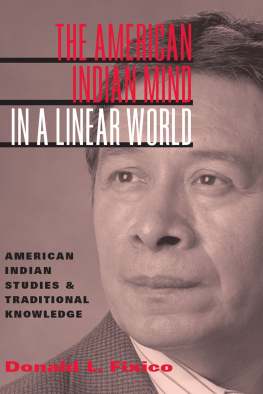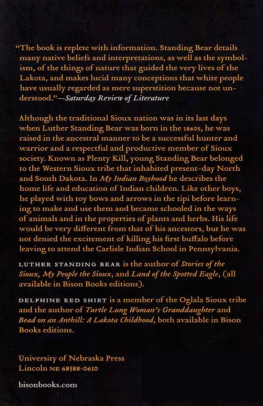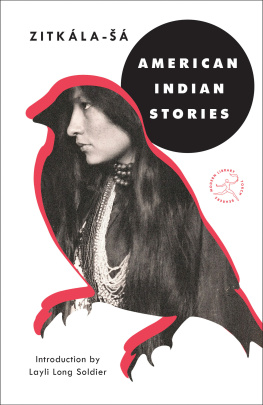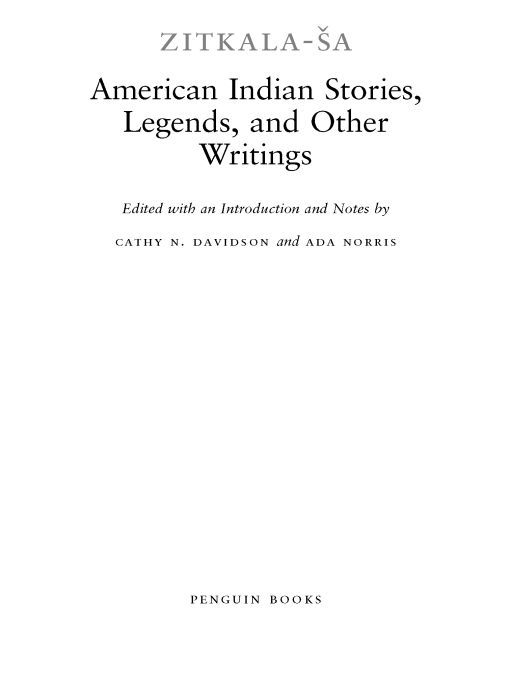Table of Contents
AMERICAN INDIAN STORIES, LEGENDS, AND OTHER WRITINGS
ZITKALA-A, known also as Gertrude Simmons Bonnin, was born on the Yankton Sioux reservation in South Dakota in 1876. A lifelong writer and activist, she is best known for a series of semiautobiographical stories about her childhood and schooling in Eastern boarding schools. Zitkala-a was a teacher, a student at the New England Conservatory of Music, coauthor of an opera entitled The Sun Dance, secretary-treasurer of the first pan-Indian political organization, the Society of American Indians, and editor of its quarterly magazine, American Indian Magazine. She wrote fiction, manifestos, speeches, poetry, and musical scores, retold Sioux legends, and was a prolific letter writer. She was founder and president of the National Council of American Indians, the Washington-based tribal advocacy group that she led until her death in 1938.
CATHY N. DAVIDSON, Ruth F. DeVarney Professor of English and vice provost for interdisciplinary studies at Duke University, is past president of the American Studies Association and former editor of the journal American Literature. She has written or edited more than fifteen books, including Revolution and the Word: The Rise of the Novel in America, Reading in America, The Oxford Companion to Womens Writing in the United States (with Linda Wagner-Martin), Closing: The Life and Death of an American Factory (with photographer Bill Bamberger), and Thirty-Six Views of Mt. Fuji: On Finding Myself in Japan.
ADA NORRIS is a Ph.D. candidate in the English Department at Duke University completing a dissertation on Zitkala-as pedagogical stories and cultural contexts.
Acknowledgments
The editors would like to thank the Special Collections and Manuscripts staff at Brigham Young University for their solici tous attention and generous access to their well-managed and organized collection. Ada Norris visited this archive to look at Zitkala-as papers as well as manuscripts of the score and libretto of The Sun Dance opera in July 2001. David Whittaker, Russ Taylor, and the students at Special Collections were tremendously helpful. We also thank the Interlibrary Loan staff of Duke University Library for filling many, often time-consuming, requests over the past couple of years without which this would have been a much more difficult endeavor.
Ada Norris: Thanks to Caroline White and everyone at Penguin Classics for their commitment to this project. For funding, thanks to the Graduate School of Duke University for support for a trip to Utah, the Department of English for an Ashbel Brice Award for some of the key research, and the John Hope Franklin Institute for Interdisciplinary Studies in the Humanities for a fellowship giving intellectual and financial support in the final stages of this project. Special thanks to Cathy N. Davidson for bringing me onto the project, and for her unparalleled generosity as a coeditor, coteacher, mentor, and scholar. Also, my deepest thanks to Dana Seitler for all her help, editorial and otherwise.
Cathy N. Davidson: I would like to thank the editors at Penguin Classics, and especially Caroline White, who aggressively pursued this project for several years in order to make Zitkala-as work available to the widest possible general readership. I also thank Ada Norris, without whose historical and archival research this would have been a far more ordinary book. In two years of team-teaching and another two years of discussing Zitkala-as writing, Ada Norris has been the best possible interlocutor, collaborator, and intellectual partner. I wish to thank Ken Wissoker for his editorial insights and loving support. Finally, I thank the many Native American and Canadian First People scholars, writers, and activists who, for the past two decades, have illuminated our thinking, teaching, and research. In particular, this volume was partly inspired by my brother-in-law, the late Roy Sykes CunninghamMtis activist and advocate and human being extraordinaire.
Durham, North Carolina May 2002
Introduction
As writer, teacher, and activist, Zitkala-a played a major part in articulating the role of Native Americans in an era of westward expansion, settlement, and conquest. Born in 1876, Zitkala-a was a witness, survivor, and trenchant chronicler of major events in white-Indian relations of the nineteenth and early twentieth centuries. The year of her birth coincided with the Battle of Little Big Horn (also called the battle of Greasy Grass), and with the beginning of the systematic violation by the U.S. government of the 1868 Treaty of Laramie. This treaty had established Native rights and control over the Great Sioux Reservation, which included parts of present-day South Dakota, North Dakota, Montana, and Wyoming. But with the discovery of gold in 1873, the land suddenly became desirable for U.S. interests. By 1876 the aggressive assault by the U.S. Army against the Sioux reached its climax. George Custer, with the Seventh Cavalry, attacked Sitting Bulls alliance of Sioux and Cheyenne at Little Big Horn Creek, but was surrounded by Crazy Horse and his warriors and killed. By 1877 all Sioux, except for some Hunkpapas led by Sitting Bull and Oglalas led by Crazy Horse, had surrendered. Crazy Horse was tricked and summarily assassinated in September. That same year, Congress passed a law that shrunk the Great Sioux Reservation from 134 million acres to 15 million. After this period of aggression, the United States shifted strategies, replacing violence with a massive assimilation policy: the Dawes Act of 1887 began the work of dissolving communal and tribal land rights, and government-run Indian boarding schools systematically broke apart families and installed curriculums and disciplinary structures intended to eradicate traditional tribal culture. To say that Zitkala-a was born into a transitional era in white-Indian relations seems a stark understatement.
Some of these events form the backdrop for Zitkala-as stories, particularly the three major works published in the Atlantic Monthly in 1900. Unspoken in Zitkala-as powerful semiautobiographical story cycle is the fact that another Indian massacre, the massacre at Wounded Knee and the murder of Sitting Bull, occurred while she was at home on the Yankton reservation on a school break. At this time, the popularity of the messianic Ghost Dance religion had risen among the Sioux. A peaceful spiritual practice that integrated Lakota and Christian beliefs, the Ghost Dance was based on the idea that, through dance and ritual, the decimated buffalo population and massacred Indians would come back to life again, Indian lands would be returned, and the U.S. Army and other white aggressors would disappear. In the face of overwhelming violence, it is not surprising that this apocalyptic religion found so many adherents. Fearful that the Ghost Dance would mobilize the Sioux politically, on December 15, 1890, a special unit of the Indian police was sent to murder the great Sioux leader Sitting Bull. On December 28, at least three hundred Sioux men, women, and children were killed at Wounded Knee Creek, and the Ghost Dance religion, in essence, died. Thus Zitkala-as tales are survivor stories on the most profound and compelling level.


